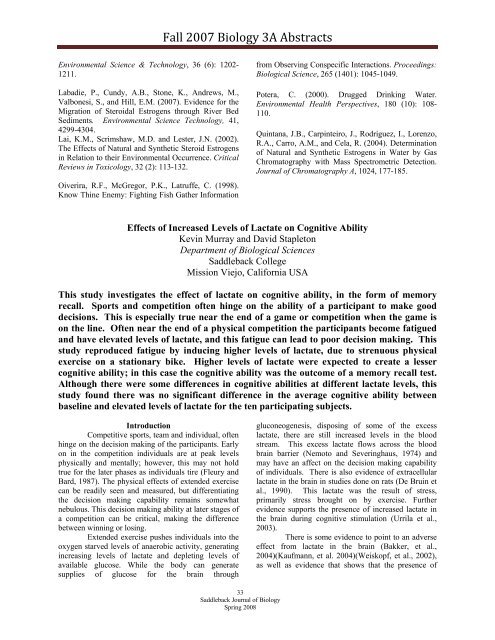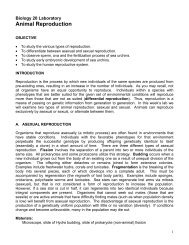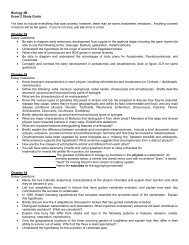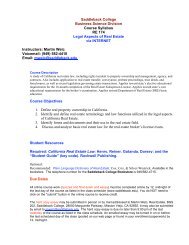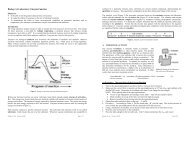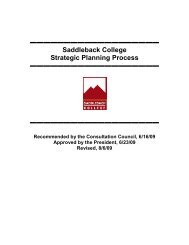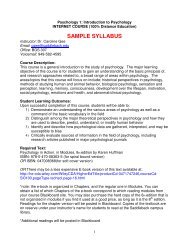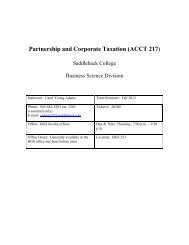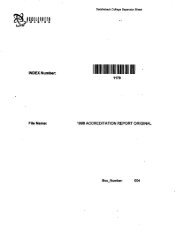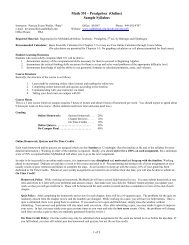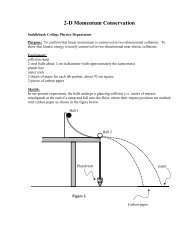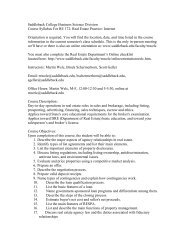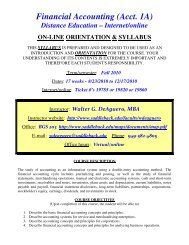Volume 6, Spring 2008 - Saddleback College
Volume 6, Spring 2008 - Saddleback College
Volume 6, Spring 2008 - Saddleback College
You also want an ePaper? Increase the reach of your titles
YUMPU automatically turns print PDFs into web optimized ePapers that Google loves.
Fall 2007 Biology 3A Abstracts<br />
Environmental Science & Technology, 36 (6): 1202-<br />
1211.<br />
Labadie, P., Cundy, A.B., Stone, K., Andrews, M.,<br />
Valbonesi, S., and Hill, E.M. (2007). Evidence for the<br />
Migration of Steroidal Estrogens through River Bed<br />
Sediments. Environmental Science Technology, 41,<br />
4299-4304.<br />
Lai, K.M., Scrimshaw, M.D. and Lester, J.N. (2002).<br />
The Effects of Natural and Synthetic Steroid Estrogens<br />
in Relation to their Environmental Occurrence. Critical<br />
Reviews in Toxicology, 32 (2): 113-132.<br />
Oiverira, R.F., McGregor, P.K., Latruffe, C. (1998).<br />
Know Thine Enemy: Fighting Fish Gather Information<br />
from Observing Conspecific Interactions. Proceedings:<br />
Biological Science, 265 (1401): 1045-1049.<br />
Potera, C. (2000). Drugged Drinking Water.<br />
Environmental Health Perspectives, 180 (10): 108-<br />
110.<br />
Quintana, J.B., Carpinteiro, J., Rodríguez, I., Lorenzo,<br />
R.A., Carro, A.M., and Cela, R. (2004). Determination<br />
of Natural and Synthetic Estrogens in Water by Gas<br />
Chromatography with Mass Spectrometric Detection.<br />
Journal of Chromatography A, 1024, 177-185.<br />
Effects of Increased Levels of Lactate on Cognitive Ability<br />
Kevin Murray and David Stapleton<br />
Department of Biological Sciences<br />
<strong>Saddleback</strong> <strong>College</strong><br />
Mission Viejo, California USA<br />
This study investigates the effect of lactate on cognitive ability, in the form of memory<br />
recall. Sports and competition often hinge on the ability of a participant to make good<br />
decisions. This is especially true near the end of a game or competition when the game is<br />
on the line. Often near the end of a physical competition the participants become fatigued<br />
and have elevated levels of lactate, and this fatigue can lead to poor decision making. This<br />
study reproduced fatigue by inducing higher levels of lactate, due to strenuous physical<br />
exercise on a stationary bike. Higher levels of lactate were expected to create a lesser<br />
cognitive ability; in this case the cognitive ability was the outcome of a memory recall test.<br />
Although there were some differences in cognitive abilities at different lactate levels, this<br />
study found there was no significant difference in the average cognitive ability between<br />
baseline and elevated levels of lactate for the ten participating subjects.<br />
Introduction<br />
Competitive sports, team and individual, often<br />
hinge on the decision making of the participants. Early<br />
on in the competition individuals are at peak levels<br />
physically and mentally; however, this may not hold<br />
true for the later phases as individuals tire (Fleury and<br />
Bard, 1987). The physical effects of extended exercise<br />
can be readily seen and measured, but differentiating<br />
the decision making capability remains somewhat<br />
nebulous. This decision making ability at later stages of<br />
a competition can be critical, making the difference<br />
between winning or losing.<br />
Extended exercise pushes individuals into the<br />
oxygen starved levels of anaerobic activity, generating<br />
increasing levels of lactate and depleting levels of<br />
available glucose. While the body can generate<br />
supplies of glucose for the brain through<br />
gluconeogenesis, disposing of some of the excess<br />
lactate, there are still increased levels in the blood<br />
stream. This excess lactate flows across the blood<br />
brain barrier (Nemoto and Severinghaus, 1974) and<br />
may have an affect on the decision making capability<br />
of individuals. There is also evidence of extracellular<br />
lactate in the brain in studies done on rats (De Bruin et<br />
al., 1990). This lactate was the result of stress,<br />
primarily stress brought on by exercise. Further<br />
evidence supports the presence of increased lactate in<br />
the brain during cognitive stimulation (Urrila et al.,<br />
2003).<br />
There is some evidence to point to an adverse<br />
effect from lactate in the brain (Bakker, et al.,<br />
2004)(Kaufmann, et al. 2004)(Weiskopf, et al., 2002),<br />
as well as evidence that shows that the presence of<br />
33<br />
<strong>Saddleback</strong> Journal of Biology<br />
<strong>Spring</strong> <strong>2008</strong>


